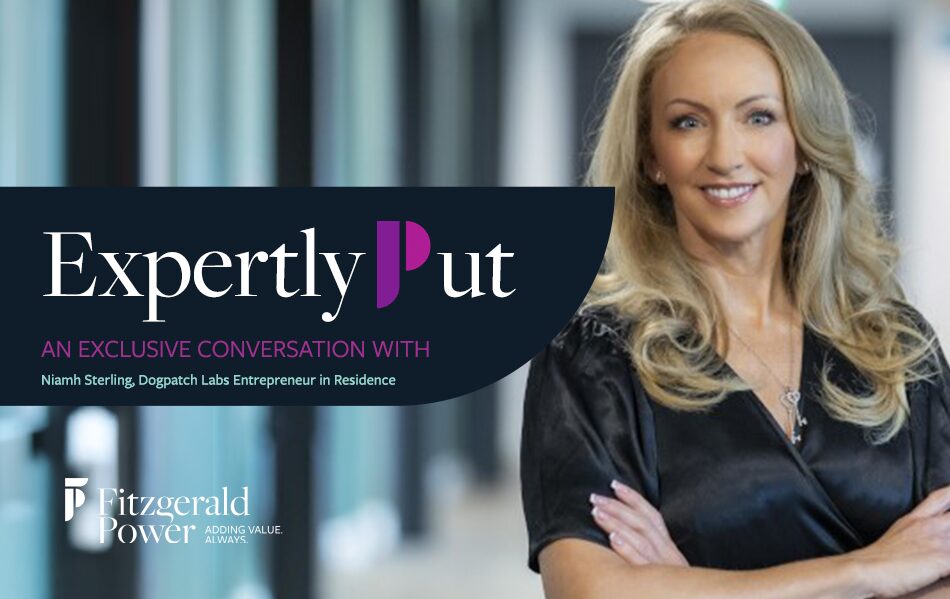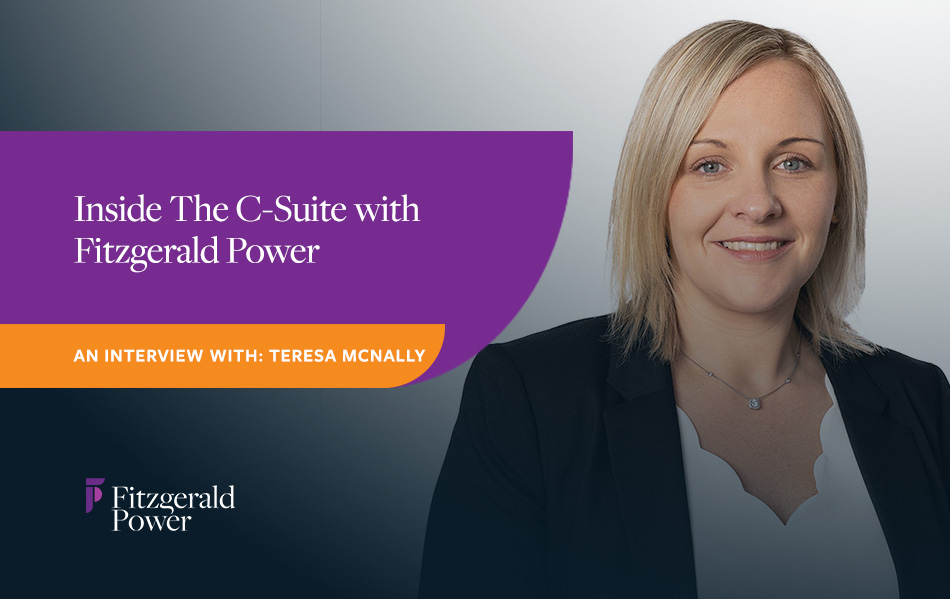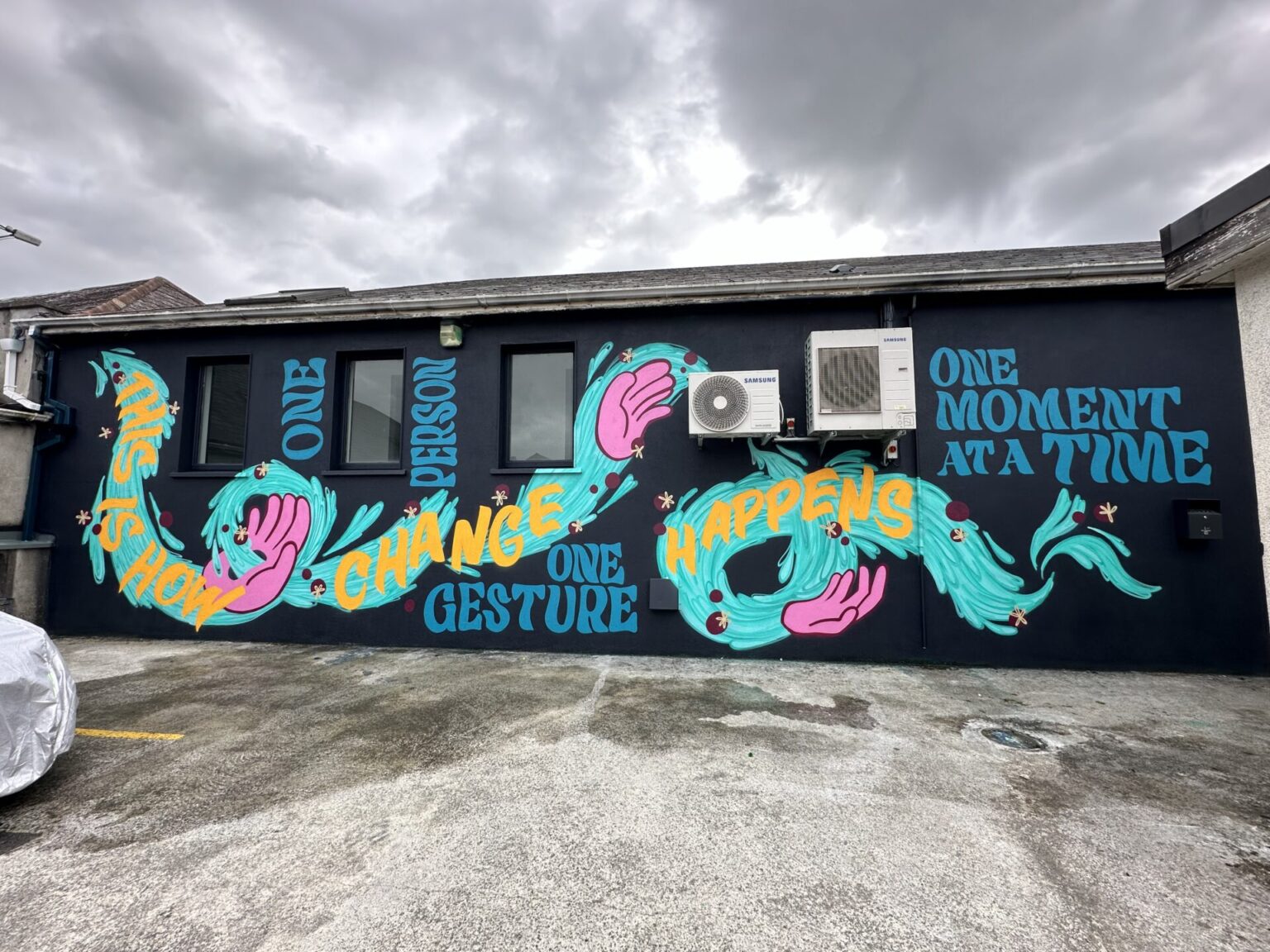Expertly Put is a series of exclusive conversations with industry experts, designed to help business owners and management teams gain a deeper understanding of the topics that matter most. In this edition, Stuart Fitzgerald sat down with Dogpatch Labs Entrepreneur in Residence, Niamh Sterling, to discuss the emotions, responsibilities and pressures of founding a startup.
The term “founder” has been so romanticised by today’s media that many have come to think of it as a fantasy job. This is despite the fact that 45% of new businesses fail within the first five years. In the real-world, founding a business means several things. You’ll be busy, tired and under pressure for an impossibly long time. With all of this in mind, I sat down with founder, investor, non-executive director and mentor Niamh Sterling, to discuss these realities, particularly for the first-time founder.
I began by asking her about the tension between commitment and creating sufficient space to actually lead a startup effectively.
Niamh (NS):
Founders have to be fully invested in their startups, but they also need to have enough emotional detachment to make strategic decisions. You can be passionate about your business but still able to keep a clear head in stressful situations. This can be challenging, especially for first-time founders, when the emotional rollercoaster can add a significant amount of stress and critically impact their performance. Great CEO’s and leaders tend to be very self aware, they have learned to manage their emotions, enjoy the wins but stay calm in difficult situations, they know their own strengths and weaknesses too, so they know when to seek advice, what’s within their control and what’s not – this allows them stay solution focused.
Stuart (SF):
Absolutely. It’s hard not to internalise the ups and downs when everything you’ve worked so hard for is constantly on the line. It’s draining.
NS:
It really is. Founders need to have tenacity and resilience. There can be a constant pressure to always be “on,” pitching investors, making crucial decisions, leading teams and showing confidence – that can be really hard when things aren’t going well. If a founder is emotionally overwhelmed, it can impact how they handle everything – from fundraising to making strategic decisions. This is where experience comes in. Second-time or experienced founders tend to be better at managing that emotional strain, they’ve seen it before – as a first time founder you often don’t know what’s coming next. I think discipline, domain expertise, time management, mentorship, and a strong support system are absolutely essential in managing the role well.. It’s not just about “toughening up”; it’s also about creating a trusted network of people who can help and advise you. That support can make all the difference, especially when you’re facing those challenging decisions.
SF:
Surely investors are looking for that balance too – someone who is passionate but also level-headed. I guess they don’t want a founder who is so consumed by the business that they risk burning out, right?
NS:
Absolutely. Investors want someone who can stay composed under pressure and think strategically. Burnout is a real risk, and if a founder is too emotionally involved, it can cloud their judgment and potentially impact the long-term viability of the business. Experienced investors can usually spot when a founder is headed toward burnout or making emotionally-charged decisions. They’ll often provide extra support, expertise and initiatives to encourage them to look after their mental wellbeing – investors want to see founders thrive and sometimes it’s about helping them find that balance.
SF:
Presumably it’s not enough to just have a great product or idea to launch a business. It’s about proving that you’ve thought through the challenges and have taken steps to mitigate risk and improve your odds of success.
NS:
Exactly. Founders should have a clear and deep understanding of their market and customer needs – even if their product/solution is still in the early stages. The point is to show that you’ve done the research, you’ve lived in your customers’ world, you deeply understand their pain points, and you’re obsessed with building a solution based on that insight.
SF:
How can founders do that effectively? What steps should they take to reassure investors and other stakeholders?
NS:
It’s all about demonstrating market need, and those early proof points can look very different depending on the sector. If your product isn’t fully developed yet but you already have early adopters in a beachhead market, that’s a strong signal. In SaaS, maybe your free trial model is converting users to paying customers at an impressive rate. In proptech, it could be customers successfully making the switch from legacy systems to your solution. For D2C, it might be brand loyalty shifts or in-app user adoption. In medtech, key proof points could be securing reimbursement codes or FDA approval. The question is: what’s the traction that de-risks this for investors?
SF:
And what about the founder’s experience? How important is that in the eyes of investors?
NS:
Founder experience and expertise is a big factor – investors look for a team with diverse skill sets and domain expertise – this gives an instant competitive edge. If a team deeply understands their market – they have often lived with the pain points, searched for a solution, couldn’t find one and have now set out to build one. Be it healthcare, cloud computing, middleware or SaaS, a founder with industry expertise knows who their buyer is in an organisation, has better technical alignment, understands market dynamics and buying decisions. It’s important to remember though that; people invest in people – this is often an 8-10 year journey, so it’s important to have a shared sense of ambition, drive, honesty and collaboration.
SF:
So, it’s not just about past exits, but also showing you can bring your experience and expertise and the lessons you’ve learned to the current business.
NS:
Exactly. Investors are betting on the founder just as much as they’re betting on the idea.
SF:
What about the tension between focusing on rapid growth versus being profitable? Recently, we’ve seen a shift toward more sustainable business models, especially after the recent venture winter. How do founders strike this balance?
NS:
The landscape has certainly changed. Investors have become more cautious, and the focus has shifted somewhat from just chasing growth at any cost to achieving profitability. Companies that were once burning through cash to capture market share are now under more pressure to show that they can become profitable and sustainable businesses. It’s about finding the right balance – growth should be sustainable and lead to long term profitability.
SF:
I imagine that balancing growth and profitability isn’t always straightforward. How can founders approach this balance without sacrificing one for the other?
NS:
It’s about having a clear path to profitability, while still being mindful of your growth momentum. Founders need to focus on growth that aligns with their goals – invest for growth but keep profitability in sight – be disciplined in spending, optimise your business model, hone your marketing, resource well, manage operations efficiently. Growth shouldn’t be aimless; it needs to be tied to a financial model that delivers profitability and sustainable success. Understand the unit economics that matter most for our business. Investors will still be interested in businesses that are growing steadily, as long as they can see the potential for long-term profitability.
SF:
With all of that in mind what are the most important metrics for founders to track?
NS: Founders should focus on metrics that matter most for their business eg ARPU, CAC/LTV ratio, conversion rates, manufacturing costs, gross margin, retention – know them, track them. If you can show that your business is acquiring customers at a profitable rate and that those customers are sticking around and generating long-term value, investors will see that as a sign that your business is sustainable. The unit economics needs to be in line with your growth model. It’s not just about top-line revenue; it’s about ensuring that every customer you acquire contributes positively to the bottom line in the long run.
SF:
Makes sense. It’s all about proving the sustainability of the model. Changing tack, what happens after investment is secured? How do founders manage investor relationships post-funding?
NS:
Transparency is key. Once funding is secured, founders need to keep investors in the loop with regular updates – good news and bad. Investors don’t like surprises, especially negative ones, so maintaining transparency is vital. The relationship should be collaborative, where both the founder and the investor are working toward the same goal. Investors know that startups don’t have a linear journey – they expect bumps along the way. As long as they’re kept informed and involved in solving problems, they’ll be more supportive. It’s about creating a strong partnership where everyone is on the same team.
SF:
And what kind of updates should founders provide? How often should they communicate with their investors?
NS:
It really depends on the business, but most founders I know do monthly updates. These are high-level updates that touch on the key areas: what’s working, what’s not, what progress has been made, where the challenges lie – and any asks of their investors. These updates keep investors up to date without overwhelming their inbox. For more detailed updates, a quarterly meeting is often more appropriate, where you can dive deeper into the financials, KPIs, and the longer-term strategy, but monthly updates are typically the baseline for most companies. Transparent and regular updates also shows that you’re on top of the business. But it’s also important to tailor the communication to the needs of your investors – some might prefer high-level updates, while others may want more granular details.
SF:
To try to summarise the key takeaways, is it fair to say that communication, managing growth sustainably, and being transparent are the cornerstones of a successful startup journey?
NS:
Yes, if founders have a customer-centric approach to product development that secures early adopters, develop a strong go-to-market strategy, focus on sustainable growth and managing investor relationships transparently – they are giving themselves a head start to success!
Until next time.






